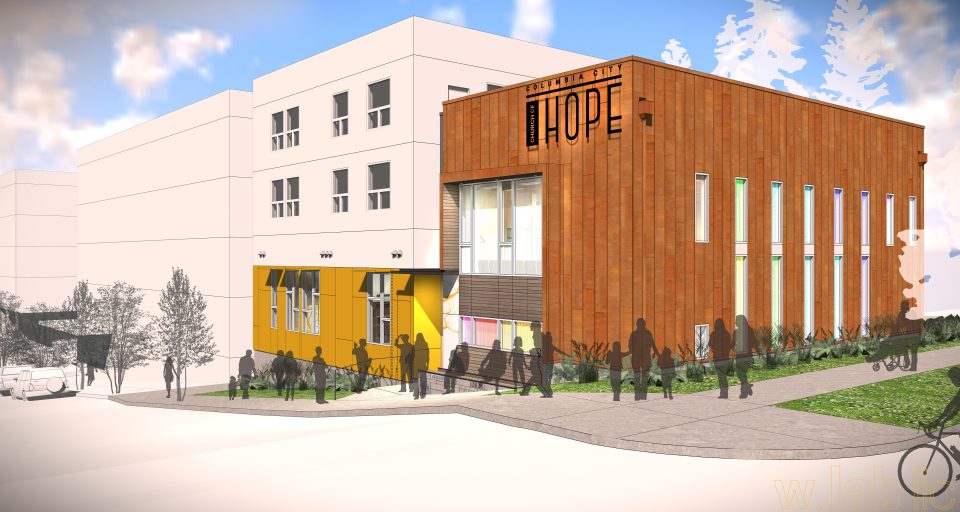In a triumph of rebirth and renewal, a single Seattle block will soon accommodate not only an ELCA church but homes for dozens of people.
Columbia City Church of Hope, founded in 2010 when the century-old Bethlehem Lutheran closed, will share its redeveloped block with affordable housing units as well as a dual-language child development center.
Until about 12 months ago, Columbia City occupied the former Bethlehem building in Seattle’s Columbia City neighborhood. But the plan from the outset was for the church to eventually leave the crumbling edifice for a mixed-used development in a city where rents and home prices rank among the nation’s most expensive.
The Rev. Darla DeFrance, pastor of Columbia City, moved to Seattle in 2007 to serve as a regional director for Lutheran Volunteer Corps (LVC). Having grown up in rural Whitehall, Mont., she headed east to study at Duke University and Princeton Theological Seminary before returning to her home state to be an associate pastor in Kalispell, Mont.
During DeFrance’s time at LVC, the stepping stones leading Columbia City to the brink of its exciting new home began to fall into place.
“I was working in a regional office in a downtown church, and they were tearing down part of that building to make affordable housing,” DeFrance said. “I said there was a Lutheran church in my neighborhood that seemed to have plenty of space, so we rented space at Bethlehem Lutheran. Then I heard the synod wanted to do a new church there. I live there, I work in that building, and they asked me to be mission developer for that church.”
The aging Bethlehem Lutheran building proved somewhat rocky ground for a church planting, but nevertheless Columbia City flourished to become today’s diverse group of about 80 members.
“It was unreinforced masonry construction in a quake area,” DeFrance said. “The heat didn’t work. We had blankets—we couldn’t use space heaters because the wiring was so bad. Chunks of stained glass were falling from the windows.”
Columbia City and the Northwest Washington Synod spent roughly a decade clearing the legal, financial and technical hurdles involved and forging the alliances necessary to bring the affordable housing dream to life.
The primary partner is the nonprofit El Centro de la Raza—the Center for People of All Races. El Centro acquired the Bethlehem real estate and two adjacent properties and will supervise the ambitious rebuilding project, which will include the new José Marti Child Development Center as well as 40 one-bedroom, 29 two-bedroom and 18 three-bedroom apartments.
According to El Centro, rents at the new complex, which it’s calling the Four Amigos-Beloved Community, will range from $651 to $1,805—well below the going rates in Columbia City and Seattle.
“Our neighborhood’s losing a lot of diversity because housing is so expensive,” DeFrance said.
DeFrance’s congregation moved out of the Bethlehem building on Reformation Sunday in 2022, worshiping in the community space of a nearby elder care facility and, during the summer, at a neighborhood park.
“We’ve had a year of being in the wilderness,” she said. “A lot of our members don’t have cars, so we wanted to keep it close by. Meeting outside in a park, being a wild church, allowed us to connect more deeply in the neighborhood. Being outside of a regular building is inconvenient at times—I don’t have an office—but we have a lot more chance encounters in the neighborhood.”
Demolition at Bethlehem was in full swing by spring 2023—and early stages of reconstruction were visible by then too, a symbol of the coming rebirth.
In its new home, Columbia City Church of Hope will occupy just 2,500 square feet, but a high ceiling allows for extra room in the form of a mezzanine level.
DeFrance hopes the housing component will be ready by January 2025. “Once that’s completed, we can take possession of our empty shell and finish it out—the hope is sometime in 2025.”
Other congregations in the Northwest Washington Synod are supporting Columbia City during its transition, she said. Shepherd of the Valley in Maple Valley, Wash., has been storing glazed bricks from the old Bethlehem building, and Holy Trinity Lutheran Church on Mercer Island, Wash., is warehousing Columbia City’s altar and baptismal font as well as pews that, in disassembled form, will serve as sound baffles.
Trinity also raised $50,000 to assist with Columbia City’s move to its forward-thinking new home.
“Churches are valuable spaces for a community,” DeFrance said. “We need to be more creative and collaborative in how we use the space, and we’re excited to have a space that works better for things like live music and healing and recovery groups.
“It’s hard to know what the church of the future is going to look like, but the spaces we need probably aren’t hundreds of seats for people sitting in pews,” she said. “In our new space we’ll have our connection with El Centro de la Raza, which shared our vision, and all of these new residents.”






